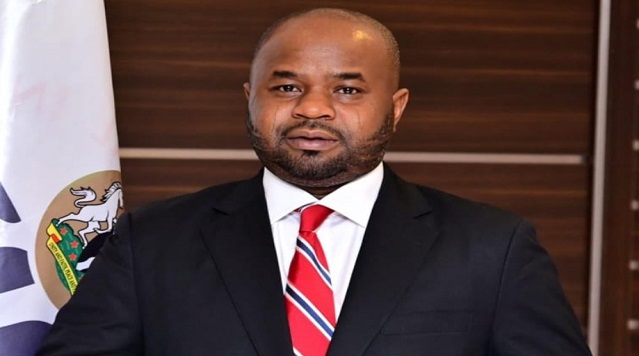News
Praise, Worship as TD Shut Down Computer Village with Praise Flame

Otigba Street in the heart of Computer Village, Ikeja – Nigeria’s ICT and accessories hub – was transformed on Thursday June 1st as Technology Distributions Ltd., Sub-Saharan Africa’s biggest ICT distributors, unleashed a heavyweight cast of Gospel artistes including Chioma Jesus, Joe Praise, Monique, Enkay, Chika 100%, Sammie Okposo and Big Bolaji, for a morning dose of divine worship, praise and outpouring of God’s blessings at the second edition of a market place evangelical initiative tagged Praise Flame.
For many traders, patrons, representatives of Original Equipment Manufacturers and other members of the Computer Village ICT eco-system, the day will remain indelible in the memory.
The usual Thursday market-place environmental sanitation did not in any way deter from the spirit and attendance levels for the concert. Traders were already gathered round early in the morning to sanitize their spirituality. To them, the concert was more important than anything else.
By 8am, the stage set was already vibrating to the sound check from various upcoming artistes – a signal to the few who were still engaged in the clean-up exercise to hasten and round up the exercise.
Monique was the first from the line-up of artistes to perform. Her appearance on stage brought the crowd closer to the stage barrier, setting the tone for what was to follow. Her performance was followed by Chika 100% who delivered with so much energy that charged the atmosphere. Next up was fast rising UK-based Nigerian Urban Contemporary Gospel artiste, Enkay who came on board with a soul-lifting rendition of her major works.
Joe Praise was already rearing to go backstage before he was called upon to perform. Seemingly amazed at the huge ovation coming his way, the talented singer delivered a memorable performance after which he described Praise Flame as the best street concert he has ever featured in. Then came the performance of Sammie Okposo whose energetic approach, silky steps and repertoire of praise song kept the crowd agog, of course with the usual white handkerchief in tow. The ‘Wellu-Well’ crooner also took the opportunity to dedicate a birthday song with some words of prayers for Tim Tehila, CEO of Tehila Records and initiator of Praise Flame.
Ibadan-based artiste, Big Bolaji also thrilled the crowd with powerful gospel messages and some comic relief. His songs warmly ushered in Chioma Jesus who has been highly anticipated. As usual, Chioma Jesus put-up an electric performance that took the crowd into a highly-spiritual level. The stage barriers were almost collapsed but the security guards were able to manage the pressure from the crowd. Chioma sang and prayed prophetically. She also made a special prayer for Joe Praise whose wedding is coming up in a few weeks.
Speaking at the event, Tim Tehila expressed delight at the wonderful performances by the various artistes despite time constraints. He expressed his gratitude to the Management of Technology Distributions Ltd. for supporting the event, while also disclosing plans to take Praise Flame to other locations such as Alaba International Market and Trade Fair. He also expressed his optimistic that more testimonies would be recorded from this year’s concert.
This second edition of Praise Flame was sponsored by Technology Distributions, with the Tehila Records crew on ground to support some of the artistes in what looked like a non-stop gospel performance. Other organizers are Adeniyi Olasoji, Chairman of Computer Village, Ikeja; Godfrey Nwosu, President of Phone Allied Products Dealers Association and Boniface Ania, President of Computer Allied Products Dealers Association.
News
NRS Chairman Outlines Ways Nigeria can Move from Potential to Economic Prosperity

Zacch Adedeji, chairman of the Nigeria Revenue Service (NRS) has called for a paradigm shift in dependence on raw material exports to one that embrace ideas, innovation and the production of complex products as a pathway to sustainable economic growth and national prosperity.

Adedeji made the submission while delivering the maiden distinguished personality lecture of the Faculty of Administration, Obafemi Awolowo University (OAU), Ile-Ife, Osun State, on Thursday.
A statement by his Special Adviser on Media, Dare Adekanmbi, said Adedeji, in the lecture entitled, ‘From Potential to Prosperity: Export-led Economy’, stressed the need to rethink growth through the lens of complexity by not just producing more of the same stuff.
He lamented that Nigeria possesses a high-tech oil sector and low-productivity informal sector as well as lacking “the vibrant, labour-absorbing industrial base that serves as a bridge to higher complexity.”
The NRS boss stated that Nigeria witnessed stagnation in its exportation drive for three decades between 1998 to 2023, and only added six new products in its export basket list between 2008 and 2023.
“Because of our current position, the Harvard Atlas concluded that we are positioned to take advantage of very few opportunities to diversify using what we already know.”
Adedeji urged Nigeria to learn from the world by comparative study of success and failure like Vietnam, Bangladesh, Indonesia, South Africa and Brazil.
“We are not just looking at numbers in a vacuum; we are looking at the strategic choices made by nations like Vietnam, Indonesia, Bangladesh, Brazil, and South Africa over the same twenty-five-year period. While there are many ways to under perform, the path to success is remarkably consistent: it is defined by a clear strategy to build economic complexity.
“When we put these stories together, the divergence is clear. Vietnam used global trade to build a resilient, complex economy, while the others remained dependent on natural resources or a single low-tech niche.
“There are three big lessons here for us in Nigeria as we think about our roadmap. First, avoiding the resource curse is necessary, but it is not enough. You need a proactive strategy to build productive capabilities.
“Vietnam’s success came from integrating itself into Global Value Chains (GVCs). They positioned themselves as the assembly hub for the world’s electronics, importing high-tech parts and exporting finished products.
“This allowed them to “borrow” technology and management skills from abroad to build their own know-how.
“Nigeria, on the other hand, remains a supplier of raw materials to these chains, not an active participant within them. We must realise that productive capabilities are not permanent. The examples of South Africa and Brazil show us that you can actually lose your industrial edge if you are not careful. Over-reliance on the easy path of resource extraction creates economic and political incentives that crowd out the difficult, long-term work of building an industrial base.”
He added that for Nigeria, which is at an even earlier stage of development and even less diversified than these nations, the warning is stark.
“Relying solely on our natural endowments isn’t just a path to stagnation; it’s a path to regression. The global economy increasingly rewards knowledge and complexity, not just what you can dig out of the ground. If we want to move from potential to prosperity, we must stop being just a source of raw materials and start being a source of ideas, innovation, and complex products.
He added that President Bola Tinubu has already begun the difficult work of rebuilding the economy to ensure collective knowledge to innovate, produce and build a resilient economy.
“The journey from potential to prosperity is not a short one, but with the right map and the right resolve, it is a journey we can finally complete,’ he added.
News
CIoD, NIPSS Partner to Deepen Governance, Leadership Standards

The Chartered Institute of Directors Nigeria (CIoD Nigeria) and the National Institute for Policy and Strategic Studies (NIPSS) have signed a memorandum of understanding (MoU) on capacity building, governance advocacy and leadership development across the public and private sectors.

The move, the institutes said, is aimed at deepening ethical leadership, policy coherence and corporate governance excellence in Nigeria.
Both institutions are expected to leverage their combined expertise, resources, and national influence to strengthen the quality of leadership and governance practices that underpin sustainable national development.
The MoU was signed by the Director-General of NIPSS, Kuru, Prof. Ayo Omotayo, and the Director-General/Chief Executive Officer of CIoD Nigeria, Dr Taiwo Nolas-Alausa.
Under the MoU, the parties will jointly design and deliver training programmes, seminars, workshops, and conferences focused on corporate governance, ethical leadership, and strategic decision-making.
A major highlight of the collaboration is the customisation and delivery of CIoD Nigeria’s Company Direction Course 1 (CDC 1) for top-level technocrats, policy initiators, and executors undergoing short courses at NIPSS—providing a structured pathway into professional membership of CIoD Nigeria and the development of chartered directors.
The collaboration also provides a framework for knowledge exchange, with CIoD Nigeria sharing policy insights, research findings, and sectoral recommendations to enrich NIPSS’ policy research and national development discourse, while NIPSS mobilises its institutional goodwill and networks to promote governance education across Nigeria’s public and private sectors.
Speaking on the significance of the MoU, both institutions reaffirmed their shared belief that strong institutions, ethical leadership, and sound governance practices are critical to solving Nigeria’s complex development challenges and positioning the country for long-term growth.
The partnership, which takes effect upon execution, reflects a shared commitment to nurturing leaders of competence, character, and conscience—leaders equipped not only to manage organisations, but to shape policies and institutions that serve the national interest.
News
Leadway Assurance Commences Use of Fintech in Insurance Product Distribution

Leadway Assurance has entered into strategic partnership with Paga, the fintech company behind the Doroki merchant platform for the distribution of insurance products.

In the partnership, Paga will use its technology to deliver comprehensive insurance solutions designed specifically for Doroki merchants. The collaboration aims to help merchants safeguard their businesses against everyday risks and recover quickly from unforeseen events. Speaking on the partnership, the General Manager, Doroki Merchants, Arike Okwunowo, said the development meant that its merchants could focus on growing their businesses with peace of mind due to insurance protection.
“At Doroki, we see our merchants as partners in driving economic activity across Nigeria’s retail landscape. This partnership with Leadway, an insurer with decades of experience and a strong reputation for reliability, means our merchants can focus on growing their businesses with the peace of mind that they’re protected,”
Also commenting on the development, Head of Digital Business, Leadway, Diana Mulili reiterated Leadway’s commitment to expanding access to financial security for every Nigerian, saying, “At Leadway, we believe insurance should integrate seamlessly into the everyday realities of people and businesses.
“By partnering with Doroki, we are embedding practical, easy-to-understand insurance solutions into a platform—helping them protect their income, assets, and livelihoods while continuing to grow with confidence.”

 News3 days ago
News3 days agoNew Study Reveals How Moniepoint Powers Nigeria’s Downstream Oil Sector with Same-Day Settlements and Working Capital Boost

 E-Financial2 days ago
E-Financial2 days agoMajority of Nigerians do not Trust Govt with Tax Revenue – SBM

 Telecom2 days ago
Telecom2 days agoMoMo PSB, SMEDAN Forge Pact to Digitise Nigeria’s SMEs

 News2 days ago
News2 days agoLeadway Assurance Commences Use of Fintech in Insurance Product Distribution

 E-Business2 days ago
E-Business2 days agoNDPC Commits to Balancing Data Privacy, Protection Information

 E-Financial2 days ago
E-Financial2 days agoWhy FirstBank Wrote off N748Bn Bad Loan – Otedola

 Telecom2 days ago
Telecom2 days agoMTN Ignites Teacher Revolution: 5,000 Digitally Armed for Phase Two

 General News2 days ago
General News2 days agoFG Partners World Bank, AfDB on Climate Action














